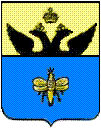Klimavichy
Klimavichy (Belarusian: Клiмавiчы; Russian: Климовичи, Klimovichi, Polish: Klimowicze; Łacinka: Klimavičy) is a city in the eastern Belarusian Mogilev Region. Klimavichy is located 124 km (77.05 mi) east of Mogilev on the bank of Kalinica River and is the administrative center of the Klimavichy District since 1924. As of 2009, its population was 17,064.[1]


History
First references in historical documents are dated by 1581 in relation to Mścisław Voivodship of the Grand Duchy of Lithuania. It was granted city status in 1777, and a Coat of Arms in 1781. According to the census of 1897, the city had 4,714 inhabitants. 50.2 percent were Orthodox, 47.9 percent Jews and 1.5 percent Catholics.
It was occupied by Nazi Germany during World War II on August 10, 1941 and liberated in October 1943.
In January 1939, there were 1,693 Jews in the village. There was a Yiddish school until 1938. The majority of the Jews were merchants. There were 4 executions of Jews in Klimovichi. At the end of August 1941, 13 Jews were arrested, taken to the Jewish cemetery in order to dig a pit. They were shot there afterwards. The second execution took place on November 6, 1941. Some Jews were sent to work and the remaining Jews were gathered in a garage near the hospital. Germans took their valuables. The Jews were then displaced near the airport, not far from the village of Dolgaya Gora and were shot by Germans and local policemen. On the same day, the Jews who were sent to work were shot at the same location. According to some sources, between 750 and 900 Jews were killed on that day. After this massacre, 80 Jews remained alive. They were concentrated in one house. At the end of November 1941, these Jews were forced to walk to Melovaya Gora and were shot. In April 1943, the children from mixed-families were imprisoned by the Germans and were shot on April 12, 1943.[2]
The city and especially its raion heavily suffered during the Chernobyl disaster.
References
- Численность населения областей и районов: Могилевская (PDF) (in Russian). Национальный статистический комитет Республики Беларусь. Archived from the original (PDF) on 18 September 2010. Retrieved 30 January 2012.
- http://yahadmap.org/#village/klimovichi-klimavichi-mogilev-belarus.654
